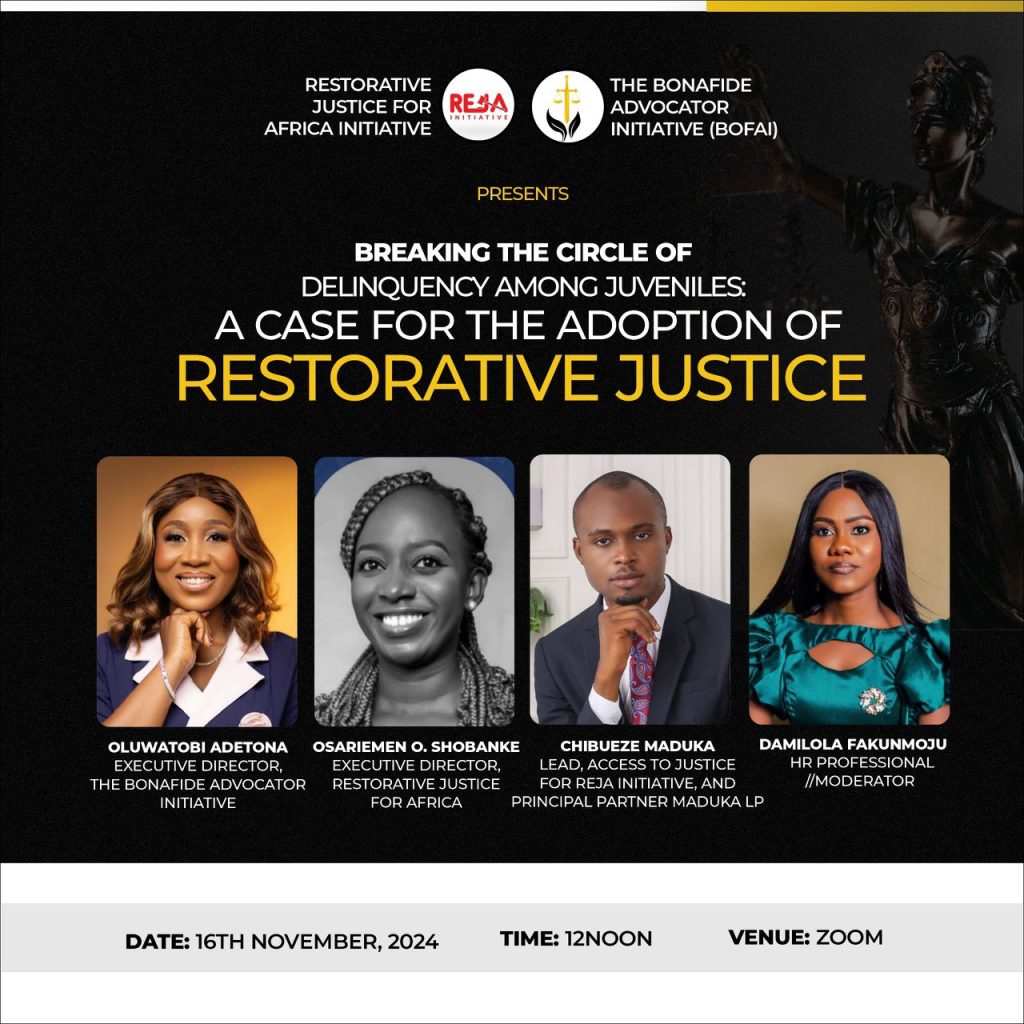Report on the Webinar held on the 16th of November, 2024 organized by The Bonafide Advocator Initiative (BOFAI) and Restorative Justice for Africa (REJA)
Topic: Breaking the Cycle of Delinquency Among Juveniles – A Case for the Adoption of Restorative Justice
The Bonafide Advocator Initiative (BOFAI) and Restorative Justice for Africa (REJA) successfully hosted a groundbreaking webinar titled “Breaking the Cycle of Delinquency Among Juveniles: A Case for the Adoption of Restorative Justice.” This event brought together legal experts, social advocates, and community leaders to explore innovative and restorative approaches to addressing juvenile delinquency.
The webinar focused on advancing sustainable strategies to prevent juvenile delinquency, rehabilitate offenders, and reduce recidivism. Through an engaging discussion of key topics, participants were equipped with practical insights and policy recommendations for driving transformative change in juvenile justice systems.
Some of the Subtopics covered:
1. Identifying the Root Causes of Juvenile Delinquency: Socioeconomic, Educational, and Systemic Factors
This session, presented by Oluwatobi Adetona, who delved into the multifaceted causes of juvenile delinquency. Emphasis was placed on the role of poverty, lack of access to quality education, systemic inequities, and broken family structures in pushing juveniles toward conflict with the law. The speaker highlighted the importance of addressing these root causes through community interventions, mentorship, and empowerment programs such as those offered by BOFAI.
2. The Position of the Law Pertaining to Juvenile Offenders
Led by Chibueze Maduka, this segment examined the legal framework governing juvenile offenders, focusing on gaps in legislation, the inadequacy of punitive measures, and the need for child-centered approaches in the justice system. The session emphasized the importance of aligning domestic laws with international conventions such as the UN Convention on the Rights of the Child, to ensure that the rights and welfare of juveniles are protected.
3. Strengthening Community-Based Alternatives to Incarceration: Restorative Justice Programs, Partnerships, and Policy Changes
In this session, Osariemen Shobanke explored the benefits of restorative justice programs over traditional incarceration. Discussions revolved around creating partnerships with community stakeholders, implementing diversion programs, and advocating for policy changes to support rehabilitation and reintegration. The session also featured successful case studies of restorative justice models that have been adopted in African communities.
Highlights and Outcomes:
1. The webinar fostered meaningful dialogue about shifting the juvenile justice system from punitive to rehabilitative.
2. BOFAI and REJA shared examples of their work, including community mentoring, life skills training, and advocacy for legislative reforms.
3. Participants were encouraged to collaborate and implement the recommendations shared, such as expanding access to restorative justice programs and investing in preventive interventions.
In conclusion, the webinar concluded with a strong call to action for stakeholders to prioritize restorative justice approaches in addressing juvenile delinquency. BOFAI and REJA reiterated their commitment to building partnerships, educating communities, and advocating for systemic change to safeguard the future of young people.
Today, we are taking us down the memory lane to this webinar held on the 16th of November, 2024 as the discussions held in the sessions are still of immense value to exploring and implementing Restorative Justice amongst Delinquent Juveniles.
For more information about BOFAI’s and REJA’s work or to partner with us, please contact us.





